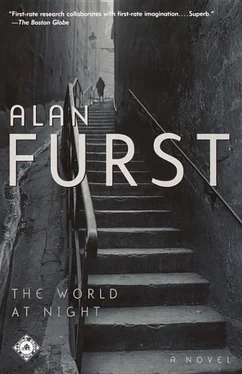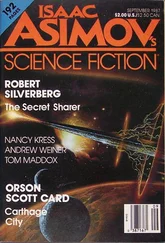Alan Furst - The World at Night
Здесь есть возможность читать онлайн «Alan Furst - The World at Night» весь текст электронной книги совершенно бесплатно (целиком полную версию без сокращений). В некоторых случаях можно слушать аудио, скачать через торрент в формате fb2 и присутствует краткое содержание. Жанр: Шпионский детектив, на английском языке. Описание произведения, (предисловие) а так же отзывы посетителей доступны на портале библиотеки ЛибКат.
- Название:The World at Night
- Автор:
- Жанр:
- Год:неизвестен
- ISBN:нет данных
- Рейтинг книги:5 / 5. Голосов: 1
-
Избранное:Добавить в избранное
- Отзывы:
-
Ваша оценка:
- 100
- 1
- 2
- 3
- 4
- 5
The World at Night: краткое содержание, описание и аннотация
Предлагаем к чтению аннотацию, описание, краткое содержание или предисловие (зависит от того, что написал сам автор книги «The World at Night»). Если вы не нашли необходимую информацию о книге — напишите в комментариях, мы постараемся отыскать её.
The World at Night — читать онлайн бесплатно полную книгу (весь текст) целиком
Ниже представлен текст книги, разбитый по страницам. Система сохранения места последней прочитанной страницы, позволяет с удобством читать онлайн бесплатно книгу «The World at Night», без необходимости каждый раз заново искать на чём Вы остановились. Поставьте закладку, и сможете в любой момент перейти на страницу, на которой закончили чтение.
Интервал:
Закладка:
“Of course.”
“She’s the colonel’s wife …”
“Daughter.”
“Cat.”
“Chicken.”
8:30 P.M.
Casson took the long way on his walk from the rue Chardin to Marie-Claire’s apartment on the rue de l’Assomption. A blackout was in effect, and the velvety darkness of the Passy streets was strange but not unpleasant-as though the neighborhood had gone back a hundred years in time. In some apartments there were candles, but that was typical French confusion at work: a blackout didn’t mean you had to cover the light in your windows, it meant you couldn’t turn on the electricity. If you did, it would somehow-one never quite understood these things-help the Germans.
The walk to Marie-Claire’s took less than fifteen minutes, but Casson saw two moving vans working that night. On the rue des Vignes, three men struggled with a huge painting, something eighteenth century, in a gilded frame. On the next street it was a Vuitton steamer trunk.
Rue de l’Assomption stood high above the Bois de Boulogne, and the views were dramatic. Lovely old trees. Meadows and riding paths. Marie-Claire’s horsey friends had their polo club in the Bois, Bruno served in some vaguely official capacity at Le Racing Club de France, there was a season box at the Auteuil racetrack, and a private room could be rented for late supper parties at Pre Catalan, the fin-de-siecle restaurant hidden at the center of the park.
Casson paused at the entry to the building. This had been his apartment when he’d married, but it belonged to Marie-Claire now. Well, that was the way of the world. The history of ownership of apartments in the 16th Arrondissement, Casson thought, would probably make a more exciting epic of France than the Chanson de Roland.
The concierge of the building had always loved him:
“Ah, Monsieur Casson. It’s good to see a friendly face. What a day, eh? What a horror. Oh the vile Boche, why can’t they leave us alone? I’m getting too old for war, monsieur, even to read it in the papers. Let alone the poor souls who have to go and fight, may God protect them. What’s that you have there? A vacherin! For the dinner tonight? How Madame trusts you, monsieur, if I sent my poor-ah, here’s the old elevator; hasn’t killed us yet but there’s still time. A good evening to you, monsieur, we all would love to see more of you, we all would.”
The elevator opened into the foyer of Marie-Claire’s apartment. He had a blurred impression-men in suits, women in bright silk, the aromas of dinner. Marie-Claire hurried to the door and embraced him, grosses bisoux, kisses left and right, left and right, then stepped back so he could see her. Emerald earrings, lime-colored evening gown, hair a richer blonde than usual, tiny eyes scheming away, clouds of perfume rolling over him like fog at the seaside. “Jean-Claude,” she said. “I am glad you’re here.” Something to say to a guest, but Casson could hear that she meant it.
And if any doubt lingered, she took him gently by the arm and drew him into the kitchen, where the maid and the woman hired for the evening were fussing with the pots. “Let’s have a look,” she said. Lifted the lid from a stewpot, shoved tiny potatos and onions aside with an iron ladle and let some of the thick brown sauce flow into it. She blew on it a few times, took a taste, then offered it to Casson. Who made a kind of bear noise, a rumble of pleasure from deep within.
“Ach, you peasant,” she said.
“Navarin of lamb,” Casson said.
Marie-Claire jiggled the top off the vacherin ‘s wooden box, placed her thumb precisely in the imprint made by the woman in the cremerie, and pressed down. For his effort, Casson was rewarded with a look that said well, at least something went right in the world today.
“Jean-Claude!” It was Bruno, of course, who’d snuck up behind him and brayed in his ear. Casson turned to see the strands of silver hair at the temples, the lemon silk ascot, the Swiss watch, the black onyx ring, the you-old-fox! smile, and a glass full of le scotch whiskey.
Suddenly, the sly smile evaporated. The new look was stern: the hard glare of the warrior. “Vive la France,” Bruno said.
They toasted the Langlades with champagne. Twenty years of marriage, of that-which-makes-the-world-go-round. Twenty years of skirmishes and cease-fires, children raised, gifts the wrong size, birthdays and family dinners survived, and all of it somehow paid for without going to jail.
Another glass, really.
With the exception of Bruno, they had all known each other forever, were all from old 16th-Arrondissement families. Marie-Claire’s grandfather had carried on a famous, virtually lifelong lawsuit against Yvette Langlade’s great-aunt. In their common history all the sins had been sinned, all the alliances broken and eventually mended. Now they were simply old friends. To Casson’s left was Marie-Claire’s younger sister, Veronique, always his partner at these affairs. She was a buyer of costume jewelry for the Galeries Lafayette, had married and separated very young, was known to be a serious practicing Catholic, and kept her private life resolutely sealed from view. She saw the plays and read the books, she loved to laugh, was always a charming dinner companion, and Casson was grateful for her presence. To his right was Bibi Lachette-the Lachettes had been summer friends of the Cassons in Deauville-the last-minute stand-in for Francoise and Philippe Pichard. Her last-minute escort was a cousin (nephew?), in Paris on business from Lyons (Macon?), who held a minor position in the postal administration, or perhaps he had to do with bridges. Bibi had been a great beauty in her twenties, a dark and mysterious heartbreaker, like a Spanish dancer. The cousin, however, turned out to be pale and reticent, apparently cultivated on a rather remote branch of the family tree.
With the warm leeks in vinaigrette came a powerful Latour Pomerol-Bruno on the attack. Casson would have preferred something simple with the navarin, which was one of those Parisian dishes that really did have a farmhouse ancestry. But he made the proper appreciative noise when Bruno showed the label around, and for his politeness was rewarded with a covert grin from Bibi, who knew Casson didn’t do that sort of thing.
They tried not to let the Germans join them at dinner. They talked about the fine spring, some nonsense to do with a balloon race in Switzerland that had gone wrong in amusing ways. But it was not easy. Somebody had a story about Reynaud’s mistress, one of those what does he see in her women, ungainly and homely and absurdly powerful. That led back to the government, and that led back to the Germans. “Perhaps it’s just a social problem,” Bernard Langlade said gloomily. “We never invited them to dinner. Now they’re going to insist.”
“They insisted in 1914, and they were sorry they did.” That was Veronique.
“I don’t think they’ve ever been sorry,” said Arnaud, a lawyer for shipping companies. “They bleed and they die and they sign a paper. Then they start all over again.”
“I have three MGs on the Antwerp docks,” Bruno said. “Paid for. Then today, no answer on the telephone.”
This stopped the conversation dead while everybody tried to figure out just exactly how much money had been lost. When the silence had gone on too long, Casson said, “I have a friend in Antwerp, Bruno. He owns movie theatres, and seems to know everybody. With your permission, I’ll just give him a call tomorrow morning.”
It helped. Madame Arnaud began a story, Bernard Langlade asked Veronique if he could pour her some more wine. Bibi Lachette leaned toward him and said confidentially, “You know, Jean-Claude, everybody loves you.”
Читать дальшеИнтервал:
Закладка:
Похожие книги на «The World at Night»
Представляем Вашему вниманию похожие книги на «The World at Night» списком для выбора. Мы отобрали схожую по названию и смыслу литературу в надежде предоставить читателям больше вариантов отыскать новые, интересные, ещё непрочитанные произведения.
Обсуждение, отзывы о книге «The World at Night» и просто собственные мнения читателей. Оставьте ваши комментарии, напишите, что Вы думаете о произведении, его смысле или главных героях. Укажите что конкретно понравилось, а что нет, и почему Вы так считаете.












